Ukraine crisis: One small optimistic sign

It sounds as if someone in the Obama administration has been re-reading George F. Kennan, who (as I noted in my column) advocated a policy of “containing” Russian expansionism — but always giving Moscow’s rulers a face-saving way to back down.
“It is a sine qua non of successful dealing with Russia that the foreign government in question should remain at all times cool and collected,” Kennan wrote in 1947, “and that its demands on Russian policy should be put forward in such a manner as to leave the way open for a compliance not too detrimental to Russian prestige.”
What does that mean in 2014, when Russian troops have occupied the Crimean peninsula (once part of Russia, now part of Ukraine) and threatened intervention to protect Russian-speakers elsewhere whether they need protection or not?
PHOTOS: A peek inside 5 doomed dictators’ opulent lifestyles
In the short run, it means taking the optimistic view that Russian President Vladimir Putin may have been surprised by the volume of foreign opposition his moves produced, and might be willing to accept the offer of some “off-ramps” to help deescalate the crisis.
In that spirit, the administration wants to send international observers into Crimea to protect the rights of Russian-speakers there, thus meeting one of Putin’s concerns and allowing all those soldiers in Russian uniforms to return to their barracks.
And the administration hopes to persuade Putin to view Ukraine’s presidential election, scheduled for May 25, as a vehicle for putting a new government in place. (Putin says the current government in Kiev isn’t legitimate, although he doesn’t seem to think ousted President Viktor Yanukovich has a political future either.)
Meanwhile, the Obama administration hopes to build support in Europe for more economic and political sanctions against Russia, especially sanctions targeted at the bank accounts of oligarchs in Putin’s inner circle; but not to impose them just yet, mostly to use them as a threat.
Will any of this work? Too early to tell. One key factor limiting Western pressure on Putin is the hesitance of European countries whose economic interests in Russia are greater than ours. The European Union is meeting Thursday to consider sanctions.
One small optimistic sign: So far, the Ukraine crisis hasn’t spilled over into Russian policy on other issues such as Syria and Iran. Russia and the United States were already at odds over Syria, but on one issue — Syria’s promise to relinquish chemical weapons — they’re still cooperating. And there’s been no sign of Russia walking away from the six-nation alliance pressuring Iran to curtail its nuclear enrichment program. It’s not a full-scale Cold War yet.
ALSO:
What’s behind Russia’s moves in Ukraine? Fear of NATO
$1 billion in U.S. aid to Ukraine? Who are we, Santa Claus?
Follow Doyle McManus on Twitter @DoyleMcManus
More to Read
A cure for the common opinion
Get thought-provoking perspectives with our weekly newsletter.
You may occasionally receive promotional content from the Los Angeles Times.











